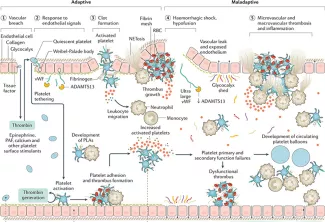Kornblith Lab Research

Figure: Platelet and endothelial interactions. From: Trauma-induced coagulopathy
Our Goals
Globally, injury remains a leading killer. The goals of our research program are to understand how blood system failure after severe injury contributes to bad outcomes, and to identify therapeutic targets and optimize treatments to improve the care of injured patients.
We do this through:
- Translational research to identify novel biology of blood system failure through the lens of platelets.
- Large observational studies to identify predictors of bad outcomes after injury.
- Clinical trials investigating therapeutics and resuscitation strategies for injured patients.
Small Cells Are Giving Big Answers About Injured Patients
Drs Kornblith and Bainton conducted a study identifying that the very smallest cells circulating in the blood, platelets, carry a genomic fingerprint that rapidly changes after a patient is injured. This platelet fingerprint can be used as a liquid biopsy to help predict which injured patients are at risk of developing complications. They are now leveraging platelet genomic fingerprints to reimagine how we understand, measure, and intervene on the biology of injured patients, and using cutting edge molecular technologies to develop a precision medicine approach to recovery from injury:
Reference URL: https://journals.lww.com/jtrauma/fulltext/2022/02000/a_new_trauma_frontier__exploratory_pilot_study_of.10.aspx
Translational Research
Post-Injury Platelet Biology and Trauma-Induced Coagulopathy
Using a well-established, large scale translational research infrastructure, one of the research group’s primary aims is to decode the mechanisms of altered platelet biology that contribute to trauma-induced coagulopathy, a multifactorial disorder of coagulation and inflammation that is a major cause of morbidity and mortality in injured patients. Patients with the highest-level trauma activation at Zuckerberg San Francisco General Hospital are enrolled into an ongoing prospective trial entitled Activation of Coagulation and Inflammation (ACIT) - Precision Approaches to Resuscitation in Trauma (PART) III.
From these patients, serial blood samples are collected for coagulation and platelet function assays.These assays include platelet aggregometry, flow cytometry, and viscoelastic measures to fully characterize platelet function, platelet surface receptor expression patterns, and coagulation profiles. Through an ongoing collaboration with Dr. Wah Chiu at Stanford University, platelet ultrastructure after trauma is being analyzed using cryogenic electron microscopy techniques. In collaboration with Drs Roland Bainton and Kyle Cromer at UCSF, and Drs Jeffrey Berger and Tessa Barrett at NYU we are reimagining how we understand, measure, and intervene on early alterations in platelets after injury by focusing on the platelet transcriptome to explore prediction and prevention of organ failure among patients who initially survive their injuries, and to identify platelet RNA modification targets that can be tested in model systems.
Observational Studies
Novel Therapeutics for Critically Injured Patients
Platelet Based Hemostatic Agents
Another focus of our research is on improving the efficacy of platelet transfusions and platelet based therapeutics. The research group is participating in a Department of Defense Congressionally Directed Medical Research Program in collaboration with the UCSF Department of Laboratory Medicine, and OHSU Division of Trauma, Critical Care, and Acute Care Surgery, for the study of “Freeze Dried Platelet Extracellular Vesicles as a Hemostatic Adjunct to Resuscitation for Prolonged Field Care.”
The DOD/CDMRP funded study is a multicenter, multi-investigator grant with primary investigators Dr. Shibani Pati and Dr. Martin Schreiber. This two year grant will explore how therapeutic product derived from platelets called platelet derived extracellular vesicles (PEVs) and lyophilized platelet derived extracellular vesicles (LPEVs) can act to stop bleeding trauma patients from bleeding to death or dying from organ failure.
Diagnostic Strategies for Blood System Failure
Improving diagnostic strategies to identify blood system failure in injured patients is another focus of our interests. We are performing a pilot research study to evaluate the performance of the CoagCare system using whole blood samples collected from patients that present to the Emergency Department at ZSFG with illness and injury.
Commonality of Platelet Biology Across Diseases
In collaboration with Drs Hillary Braun and Michael Bokoch at UCSF, we are studying the effect of liver disease and transplantation on platelet function. Patients with liver disease often have platelet dysfunction and data generated show that sera from cirrhotic patients drastically reduces the platelet aggregation response, which can be restored after transplantation.
